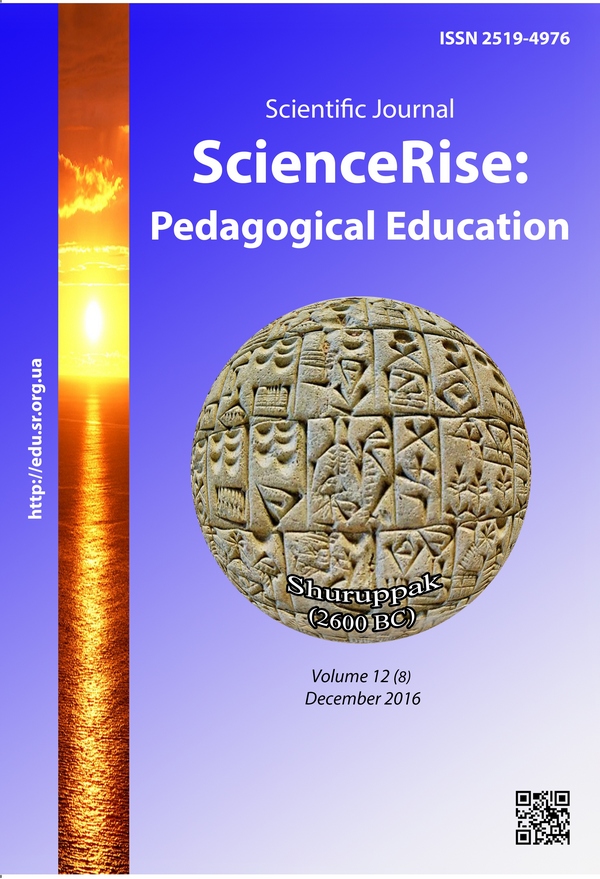The content foundations of future philologists’ professional training in the usa higher education
DOI:
https://doi.org/10.15587/2519-4984.2016.87359Keywords:
philologist, professional training, scientific approaches, curriculum, professional competences, USAAbstract
The content features of philologists’ professional training in the higher educational system of USA are presented in the article. The author considered the views of American scientists on the essence of notion “curriculum”, its types (subject-oriented and profession-oriented). The content of future philologists’ professional training was determined on the base of analysis of academic plans of American universities. The main scientific approaches (criteria, technological, micro-curricular and macro-curricular ones) and principles that the philologists’ professional training is grounded on are considered. Professional competence and its structure is characterized, professional competences that are formed on the base of defined content of training (node, leader, special ones) are analyzed. The system of disciplines coding in American experience is described and basic cycles of disciplines for future philologists are analyzed
References
- Bachman, L. F. (1990). Fundamental Considerations in Language Testing. Oxford: Oxford University Press, 420.
- Bloom, B. S., Madaus, G. P., Hastings, J. T. (1994). Evaluation to Improve Learning. New York: McGraw-Hill Book Company, 356.
- Drake, S. (2000). Integrated Curriculum a Chapter of the ASCD Curriculum Handbook. ASSN for Supervision & Curriculum, 105.
- Ginsburg, M. V., Clift, R. T. (1998). The Hidden Curriculum of the Pre-Service Teacher Education. New York: Houston, 301.
- Goodlad, J. (2007). Curriculum Development. Boston: Baker, 256.
- Hymes, D.; Pride, J. B., Holmes, J. (Eds.) (1972). On Communicative Competence. Sociolinguistics. Harmondsworth: Penguin, 269–293.
- Smith, M. (1999). Curriculum Theory and Practice. New York: Routledge, 201.
- Tyler, R. W. (1949). Basic Principles of Curriculum and Instruction. Chicago: University of Chicago Press, 128.
- Radionova, I. O. (2001). Filosofiya navchalnogo planu ta realiyi multykulturnogo suspilstva: filosofsko-pragmatychnyi aspekt [Philosophy of Syllabi and Realities of Multicultural Society: philosophical and pragmatical aspect]. Scientific Bulletin. Series “Philosophy”, 8, 20–26.
- Georgesku, D. (2006). Kurykulyarna filosofiya dvadtsyat pershogo stolittya: shcho novogo y starogo? [Curriculum Philosophy in the 21 st Century: What is old and new?]. Postmethodology, 3 (67), 2–17.
- ASCD Curriculum Handbook. Available at: http://www.ascd.org/
- Grant, G., Elbow, P., Ewens, T. (2006). On Competence: A Critical Analysis of Competence-based Reforms in Higher Education. San Francisco: Jossey-Bass, 358.
- McClelland, D. C. (1973). Testing for competence rather than for "intelligence". American Psychologist, 28 (1), 1–14. doi: 10.1037/h0034092
- Lin, G. H. C. (2007). A Case Study of Seven Taiwanee English as a Foreign Language Freshman Non-English Majors’ Perceptions about Learning Five Communication Strategies. Texas: A&M University, 245.
- Rubin, R. (1982). Assessing speaking and listening competence at the college level: The communication competency assessment instrument. Communication Education, 31 (1), 19–32. doi: 10.1080/03634528209384656
- Undergraduate Catalog (2015–2016). Georgia State University. Available at: http://enrollment.gsu.edu/files/2015/03/undergraduate_catalog_2015-2016.pdf
Downloads
Published
How to Cite
Issue
Section
License
Copyright (c) 2016 Марина Валеріївна Іконнікова

This work is licensed under a Creative Commons Attribution 4.0 International License.
Our journal abides by the Creative Commons CC BY copyright rights and permissions for open access journals.
Authors, who are published in this journal, agree to the following conditions:
1. The authors reserve the right to authorship of the work and pass the first publication right of this work to the journal under the terms of a Creative Commons CC BY, which allows others to freely distribute the published research with the obligatory reference to the authors of the original work and the first publication of the work in this journal.
2. The authors have the right to conclude separate supplement agreements that relate to non-exclusive work distribution in the form in which it has been published by the journal (for example, to upload the work to the online storage of the journal or publish it as part of a monograph), provided that the reference to the first publication of the work in this journal is included.







